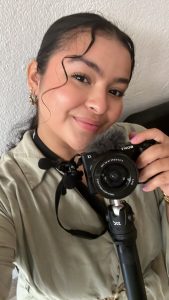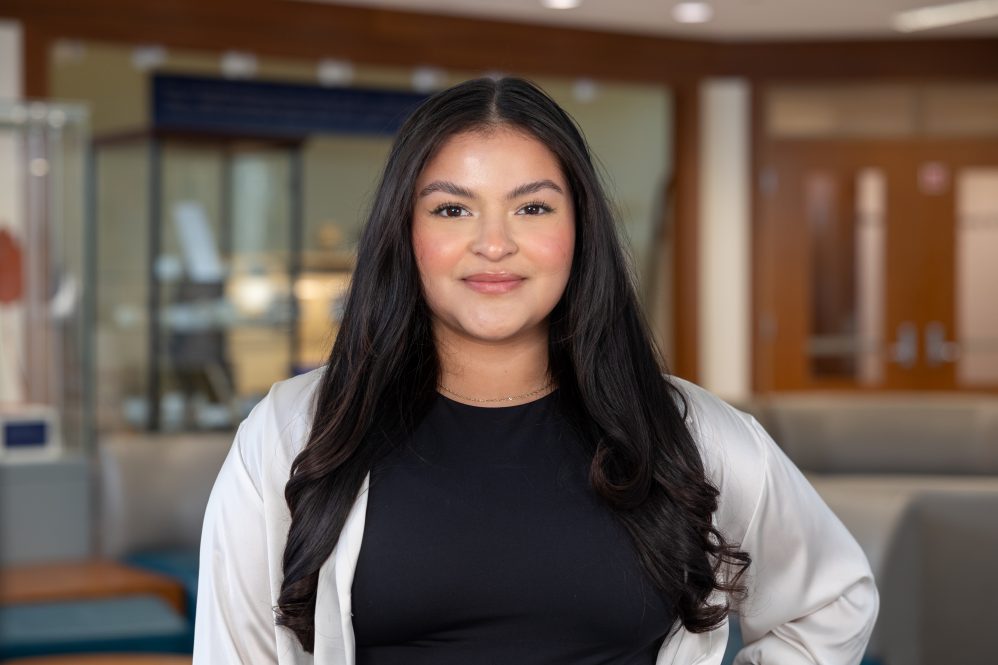Kimberly Rosado ’24 (NURS) has never taken a filmmaking class.
She says she’s never been great at talking to people, and she doesn’t enjoy public speaking. A year ago, she didn’t know much about professional cameras or audio recording. She’d only ever made small social media videos for fun.
But none of that stopped Rosado from travelling more than 3,000 miles away from home to make a feature-length documentary film, in two languages, in a different country, and all on her own – with support from a network at UConn through a pioneering program aimed at cultivating courageous leadership in young women.
“It’s just amazing how much I could have accomplished through this process,” says Rosado, who grew up in Danbury, where she completed a certified nursing assistant course while attending Danbury High School.

“I learned that I wanted to pursue nursing,” she says, and she started working as a medical assistant after graduating and before applying to the UConn School of Nursing.
Rosado, whose family is from Guatemala and Mexico, has known for some time that, as a nurse, she wants to help women. Growing up, she saw within her own family how women like her mother and grandmother, who didn’t receive formal sexual and reproductive health education in school, often didn’t know or understand what they were experiencing within their own bodies.
“In Guatemala, a lot of women don’t really like to talk about what’s happening with them,” says Rosado. “I just did a ton of research on things that are happening in Guatemala with sexual and reproductive health, and I found that they are having an epidemic of underage pregnancy.”
Between January and August 2023, the Observatory for Sexual and Reproductive Rights, or OSAR, in Guatemala reported 3,331 pregnancies of adolescents and girls ages of 10 to 19 years old, including 1,589 in girls from ages 10 to 14 – under the country’s law, pregnancies in girls under age 14 are considered to be the result of sexual violence.
Human rights and health care advocates attribute the epidemic to a number of factors, including social and religious stigma, sexual violence and assault, lack of accessibility to health care and contraceptives, lack of comprehensive education, and a patriarchal culture of “machismo” attitudes and norms in the country.
For Rosado, learning about the challenges women, adolescents, and young girls face in Guatemala – where some of her family members still live – felt personal, and she found support for her efforts to raise awareness about those challenges through the BOLD Women’s Leadership Network.
UConn’s BOLD program focuses on facilitating opportunities for women’s leadership on campus through funding, programming, and engagement in service projects. Once accepted into BOLD through a competitive application process, scholars in BOLD cohorts are given funding and support to initiate their own individual student-led projects. They find a mentor and work to refine and execute their project, which is largely implemented during the summer between their junior and senior years.
Rosado and her roommate, Daniela Bedoya ’24 (SFA), were both accepted into BOLD’s fifth cohort.
“My roommate is actually a photography major,” Rosado says. “She’s really great with cameras and stuff, so she actually helped me along the way.
“At the beginning of our junior year, the fall semester was just brainstorming ideas of what we wanted our projects to be. And I was struggling to figure out how I was going to present the project. I’m not great with public speaking. I’m not great with talking to people. So I was like, you know what? Let me just put in a documentary and let it speak for itself.”
With Bedoya’s help, Rosado found a Sony camera that was easy to learn how to use, and found a willing mentor in Barbara O’Neill, an associate clinical professor and Urban Service Track coordinator for the School of Nursing with a background in journalism and filmmaking.
“I told her about my project, and she was 100% for it,” says Rosado, who is also a part of the Urban Service Track/Connecticut Area Health Education Center Network (UST/AHEC) Scholars program at UConn. “She was so interested, and she wanted to be my mentor. She’s been helping me a lot along the way.”
Rosado planned her trip to Guatemala City for the summer of 2023, lining up interviews and planning to stay with family members, but hit an unexpected roadblock when her flight was unexpectedly and abruptly cancelled.
“My flight got pushed back a week,” she says. “So, fast-forward a week, and all those people that I had originally to interview, they couldn’t accommodate anymore.”
When she arrived in Guatemala a week later, she scrambled on the ground to regroup with a new set of interview subjects.
“My aunt – she’s a lawyer there, and she works on a lot of women’s reproductive health and maternal abuse issues,” Rosado says. “So, she helped me find a lot of these interviews, and thank God she did, because they came out perfect. They were the best interviews I could have found, I think.”
A large part of Rosado’s work in Guatemala involved interviewing subject-matter experts – including the program coordinator at OSAR, practicing doctors and midwives, and the executive director of a health center that conducts clinics for women.
Their expertise and perspective helped Rosado to tell a story about the social, cultural, and political factors that often impact the lives of women and young girls in Guatemala. Rosado took a week to teach herself how to use professional video editing software, which she used to compile her work into a 59-minute documentary entitled Una Flor Marchita. She screened her film for the first time at the Student Union in Storrs this past December.
“Una Flor Marchita translates to ‘a withered flower,’” she explains. “I picked the title, because the flower symbolizes innocence and purity, which are qualities that are robbed from these children at a young age.”
“Una Flor Marchita provides valuable insight into a subject that is underreported,” says O’Neill, Rosado’s mentor on the project. “Kimberly successfully completed a very ambitious video project. When she approached me with her project I knew, as a former video producer, all the challenges ahead and was impressed by her diligence and the final program. Kimberly learned and performed all the roles that would typically require the expertise of a scriptwriter, videographer, editor, and production team.
“I am very proud of this BOLD, UST/AHEC scholar from the School of Nursing and all that she has accomplished.”
The project was an education for Rosado not just in how to produce and edit video footage but also on the realities of life for women and girls in Guatemala. Her hope is to help educate and advocate for others by sharing their stories.
“We live in the U.S., so we have a different point of view,” she says. “There are countries that are suffering, and they don’t really know what sexual reproductive health is. They don’t know their rights as women, so they don’t seek them. They’re blind to what their rights should be. I just want to advocate and create a positive social change in society, and to offer those who live in the U.S. with a more privileged point of view a different perspective.”
She also says that she thinks that the experience of producing her film will ultimately help her to become a better nurse and a better caregiver and advocate for her patients.
“When it comes to asking sensitive questions to patients, it definitely will help me with that, because you never know what someone is going through,” she says. “A lot of these underage pregnancies are products of rape. So, talking about super sensitive topics, and how to go about it with adolescents, is important. Education is super important as well.
“So, overall, it just helped me become a better nurse, a better educator, and just a better person.”
For more information about the BOLD Women’s Leadership Network and BOLD Scholars program at UConn, visit ugradresearch.uconn.edu/bold.



